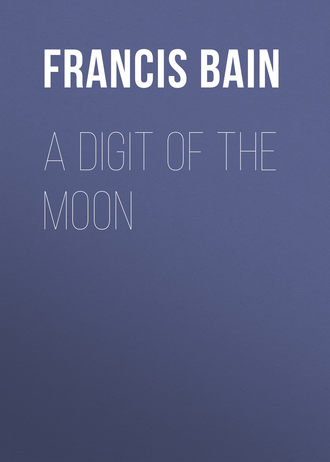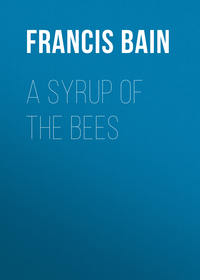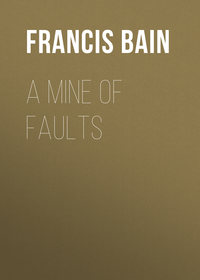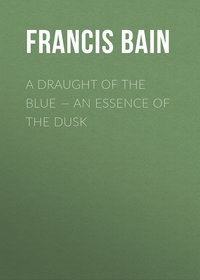 полная версия
полная версияA Digit of the Moon

F. W. Bain
A Digit of the Moon / A Hindoo Love Story
PREFATORY NOTE TO SECOND EDITION
The better to illustrate how, in Hindoo mythology, the ideas of a beautiful woman, the Moon, and the Sea, dissolve and disappear into one another, I have placed on the fly-leaf of this edition a single stanza, drawn from another part of my MS., which characteristically exemplifies that dissolving view: subjoining here, for the benefit of the uninitiated, a literal translation:
O thou lovely Incarnation of the Nectar-dropping Moon, come down from Heaven to lighten our Darkness: Delight of the Race of Man: retaining in thy Womanhood the dancing Play of the Waves of that Sea of Milk out of which thou wert originally churned by the Gods: we the Three Worlds (i. e. of Childhood, Manhood, and Age) do worship the Orb of thy Bosom that possesses for us a Threefold Mystical Feminine Energy1 being a Pitcher of Milk for us, when we are Born: a Pillow for us, in the Middle of the Path of Life: and a Shrine, in which we take refuge to die at the last.
But we lose, in a literal prose version, the reverberation, and the echo of the Sea, which undertones the meaning of the words like the accompaniment to a song. This sound we might make some attempt to preserve, without doing violence to the sense, as follows;
Like a New MODE'S exquisite Incarnation, In the Ebb and Flow of a Surging Sea,Wave-breasted Beauty, the whole Creation Wanes, and waxes, and rocks on thee!For we rise and fall on thy Bosom's Billow Whose heaving Swell is our Home Divine.Our Chalice at Dawn, and our hot Noon's Pillow, Our Evening's Shrine. Woolacombe Bay, April 29, 1901.PREFACE TO FIRST EDITION,
A Digit of the Moon is the sixteenth part of a much longer work, entitled The Churning of the Ocean of Time2. A well-known Hindoo legend recounts how the gods and antigods assembled to churn the ocean of milk3 for the nectar of immortality. After throwing in herbs of various kinds, they churned it with Mount Mandara, and obtained the nectar, with certain other things, one of which was the MOON, who by the way is often called 'the Lord of Herbs.'
But in Sanskrit, the Moon, like the Sun, is a male. Hindoo poets get over this difficulty, when they want a female Moon, by personifying his attributes, or making a part do duty for the whole. Thus, his disc is divided into sixteen parts, called 'streaks' or 'digits' and a beautiful woman is 'a digit of the moon.'
The whole work, then, called 'The Churning of the Ocean of Time,' is, like the Moon, divided into sixteen parts, each named after one of the digits of the Moon. The one now before the reader is called A Digit of the Moon, turned red by the rays of the dawning Sun4. The point lies in the play on the word red, which in the original also means 'enamoured,' 'in love.' That is to say, that the heroine of the story 'turns red,' i. e. falls in love with the hero, whose name, it will be found, is Süryakánta, or 'Sunstone.'
*****I little thought, ten years ago, that it would ever be my lot to play, as it were, the part of Boccaccio, and bring forth meat from the eater, stories from a plague. Yet here also the unexpected came about, in the following way.
Considering how recently Europe has become aware of the very existence of a Sanskrit literature, I had often wondered whether there might not be hidden away, here and there, in the vast ocean of India, literary treasures still undiscovered, which future 'churning' might bring up. But I did not expect that my question would ever receive a practical answer. However, a few years ago, when the plague was decimating the city of Poona, carrying off its victims by hundreds a day, personal acquaintance with some of the officers appointed by Government to cope with the enemy put it into my power to do a slight service to an old Marátha Brahman, whose name, by his own particular desire, I suppress. My 'service' was indeed a mere trifle, a thing of which no Englishman would have thought twice. Hindoos, however, look on these matters with very different eyes. An Englishman's house may be his castle, but a Hindoo's house is a shrine, a holy of holies, which for unhallowed footsteps to invade is desecration. I was amused to find that my old Brahman regarded me almost as though I had preserved his family from nameless and everlasting infamy. And when he subsequently discovered that I was a humble student of the 'polished, sacred' language, and could make shift to admire his beloved Kálidás in the original, his esteem for me rose to a degree almost embarrassing. He came two or three times to see me, and took an obvious pleasure in dilating on the beauties of his ancient authors to one who was at least a good listener. But it struck me as curious, that every time he went away he seemed as it were labouring to deliver himself of some important communication, which nevertheless he shrank from discovering to me; and he always eventually departed, with an air of some confusion, and his secret left untold. I thought at the time that he was only nerving himself to make some request of me, of which he doubted the reception, and was unable to screw his courage to the sticking-point. But I was mistaken.
Our interviews came to an abrupt conclusion. The plague stepped in and swept his family clean away, carrying off his wife, all his children, and various others of his kin, leaving him alone untouched – but not for long. One evening, when I came home late, having been out nearly all day, I found on my doorstep a messenger who had been waiting for me, with the inexhaustible patience of an Oriental, for many hours. The plague had remembered my old Brahman at last, and he had sent to ask me to come and see him, 'on business of importance.' I went off accordingly to a segregate camp, whither he had been removed, and, much to my relief, arrived in time to find him conscious: for he was a fine old gentleman, and when a Brahman is a gentleman, he is a striking type of humanity. He confused me by thanking me, for the hundredth time, for my good offices, adding, however, that they had been, in a certain sense, wasted, as he was the only one left of his family, and now he also, he was glad to say, was going the same way. He said, that he had been anxious to see me before he died, because he had something of value to give me. Hereupon he produced what the uninitiated might have taken for a packet of ladies' long six-button gloves, pressed together between two strips of wood about the size of a cheroot box, and tied round with string; but which from experience I knew to be a manuscript5. He handed it to me, observing that it had been in the possession of his family from a time beyond memory, and that nothing would ever have induced him to part with it, had any of that family remained to possess it; but as they were all gone, and as, moreover, it would certainly be burned by the plague authorities as soon as he was dead, it was mine, if I cared to accept it. If not, he said, with an effort to smile, no matter: it could, like a faithful wife, enter the fire on the death of its owner: yet that would be a pity, for it was worth preserving. I accepted his present, and he bade me farewell. I took leave of the old man, not without emotion, for grief and approaching death had converted his face to the very incarnation of misery; and I learned on enquiry that he died, about thirty-six hours afterwards, in the early morning.
Notwithstanding the hints let fall by its former owner, I own I was dubious as to the value of my MS., for Hindoos will admire anything in Sanskrit. But when – after having redeemed it with difficulty from the ordeal of fire and the plague authorities by subjecting it to severe fumigations – I fell to examining it6, I apologised to the manes of my old Brahman for doubting his judgment, and blessed him for his present, which is, I will venture to say, unique in literature. But I will leave the reader to judge of it for himself7, warning him only that no language loses so much by translation as the Sanskrit; and advising him, for his own sake, to read it consecutively through, or he will lose much8. I cannot refrain from observing, however, that it differs from the general run of classical Sanskrit productions in two very striking particulars – the simplicity of its style, and the originality of its matter. As to the last, every body knows that classical Sanskrit authors have no originality. They do but rhetorically reset and embellish notorious themes: such originality as they exhibit lying, not in their subject, but its treatment. Our author is an exception. Whoever he was, he must have possessed the gift of imagination: for though the plan of the story was doubtless suggested by the Wétála-panchawimshatiká, yet so novel and poetical is the use made of it that it may fairly claim to owe but little to its source, while all the particular stories are curious and original. The book differs, again, in a remarkable manner from other classical products of the Hindoo Muse in the simplicity of its style. The author would seem to have deliberately chosen the epic9 rather than the classic style as his model. We find here none of that artificiality, that straining and effort at style for its own sake, that perverse elaboration, those insipid intolerable shléhas and interminable compounds which reach a climax in the appalling concatenations of e.g. the Kédambarí. Mature Hindoo literature exhibits precisely the same tendency as its architecture: ornament is piled on ornament with aimless, tasteless extravagance, till the whole becomes nauseous, and all unity is smothered and annihilated under a load of rhetorical gewgaws. Just as the rank and luxuriant growth of a creeper will sometimes drain of its juices, dry up, and destroy the tree it was designed to adorn, so the over development of gaudy rhetorical blossoms and effeminate literary prettinesses has desiccated and broken the spring of the Hindoo mind. The best things in the literature are just those which are simplest, and therefore as a rule oldest. Literary arabesque nearly always indicates and springs from the absence of anything to say; a poverty of creative ideas. But our author has really a story to tell, and can therefore afford to exhibit it in naked unadorned simplicity.
Finally, the words which stand as a motto on the title-page have a history of their own. They are the closing lines of the Shakuntalá, and they mean, briefly: O Shiwa, grant that I may never be born again. There is a curiosa felicitas in their application to the conclusion of the story, where indeed I found them, scribbled in the margin by another hand; and though it cannot be proved, I am convinced that they were placed there by my old Brahman himself (who had Kálidás by heart), when he took his farewell of the MS., in an access of grief and despair at feeling his family annihilated and himself deprived of all that had made his life worth living, by the plague. Let us hope that the old man has had his wish, and that 'the purple-tinted god' has 'destroyed his rebirth.'
Mahábaleshwar, 1898.
INTRODUCTION
INVOCATION 10May the kindly three-eyed god[ 11 ], who stained his throat deep-purple by the draught of deadly poison which he swallowed for the preservation of the world, preserve you. May the Elephant-faced One 12 sweep away with his trunk all impediments to my thoughts, and may Wání 13 inspire into my mind for every thought its proper word.
There lived formerly, in a certain country, a king, called Súryakánta14. And his armies, guided by Valour and Policy, had penetrated in all directions to the shore of the ocean, and his intellect had gone to the further shore of all the sciences, so that one thing only was unknown to him, woman, and the love of woman. He was, as it were, the very incarnation of the spirit of misogyny, beautiful exceedingly himself, to scorch with the hot rays of his glory the despairing hearts of all fair women who might chance to cast eyes upon him, yet himself cold as snow to their own melting glances. And as time went on, his ministers became full of concern for the future of the kingdom, for they said: The King has no son, and if he should die, everything will go to ruin for want of an heir. So they took counsel among themselves, and sending for them wherever they could find them, they threw in his way temptations in the form of beautiful women, raining on him as it were showers of the quintessence of all the female beauty in the world. But all was of no avail: for no matter what shape it took, the celestial loveliness of those ladies made no more impression on the King's mind than a forest leaf falling on the back of a wild elephant. Then the ministers fell into despair, exclaiming: Truly there is a point at which virtues become vices. It is well for a King to avoid the wiles of women; but out on this woman-hating king! the kingdom will be undone for him. And they took counsel again among themselves, and made representations to the King, exhorting him to marriage. But he would not listen to anything they could say. So being at their wits' end, they caused it to be bruited about without the King's knowledge, by means of their spies, that they would give a crore15 of gold pieces to any one who could produce a change in the mind of the King, and inspire him with an inclination for marriage. But though many charlatans presented themselves and performed incantations and other such devices, no one could be found able to effect the desired end. On the contrary, the King's hostility to the other sex increased so much, that he punished every woman who came within the range of his sight by banishing her from the kingdom. And in their fear lest the kingdom should be wholly deprived of its women, the ministers had to place spies about the King, who ran before him wherever he went, and made all the women keep out of his way. And this task was as difficult as standing on the edge of a sword, for all the women in the kingdom were drawn to see him by love and curiosity as if he were a magnet16 and they so many pieces of iron.
Then one day there came to the capital a certain painter17. And he, as soon as he arrived, made enquiries as to the wonders of that city. Then the people told him: The greatest wonder in our city is our King, Súryakánta, himself. For though he is a king, nothing will induce him to have anything to do with women, from the peacock of whose beauty he flies as if he were a snake. And yet he is himself like a second god of love, so that here is the marvel: that one whom the Fish-bannered god18 has created as a sixth weapon to cleave the hearts of the female sex should have no curiosity to exert his power. Should the sun refuse to warm, or the wind to blow? But when the painter heard this he laughed, and said: I possess a charm that would act like the sun upon its gem19. And one of the spies of the ministers heard him, and went and told them of his arrival and his brag. And they immediately summoned that painter and questioned him, telling him the whole state of the case, and promising him the reward if he could make his words good. And the painter said: Contrive that the King shall send for me, and leave the rest to me.
So the ministers went and told the King: Sire, there has arrived in your capital a painter, whose equal in skill is not to be found in the three worlds. And when the King heard it he was delighted, for he was himself skilled in the art of painting and all other arts; and he caused the painter to be brought into his presence. But he, when he came, was amazed at the extraordinary beauty of the King, and he exclaimed: O King, you have caused me to obtain the fruit of my birth in bestowing on me the priceless boon of a sight of your incomparable beauty. And now only one more thing remains. I implore your Majesty to let me make a copy of it, in order that in future I may never be without it. For the sun warms even when reflected in a poor mirror. Then the King said: Show me first specimens of your skill. But beware that you show me no women, otherwise it will be worse for you. So the painter showed him a collection of pictures of all the countries in the world, but among them he had secretly placed the portrait of a woman. And as the King was turning over the pictures, one by one, he suddenly came upon that portrait. But the moment he looked at it, he fell to the ground in a swoon.
Then the painter laughed, and said to the ministers: The cure is effected: pay the physician his fee. But they replied: We must first be sure that the patient is really cured. The painter replied: You will soon find that out. Look to the King, and restore him, and see what he says when he comes to himself and finds that I am not here. For in the meanwhile I will go out of the room.
Then the ministers summoned attendants, who fanned the King with palm-leaves, and sprinkled him with water scented with sandal. And the King revived, and instantly looking round, exclaimed: The painter, the painter! The ministers said: Sire, he is gone. But when the King heard that, he changed colour, and his voice trembled, and he said: If you have allowed him to escape, I will have you all trampled to death by elephants before the sun goes down. So they went out quickly and found the painter, and fetched him in again before the King. And he fell at the King's feet, saying: May the King forgive me! Alas! my evil fortune must have mixed up that lady's portrait among my other pictures, to bring me to destruction. But the King said: O most admirable of all painters, past, present, or to come, know that you have conferred a benefit upon me by exhibiting that portrait to me, which I could not repay even with my whole kingdom. And beyond doubt, that lady must have been my wife in a previous existence, for emotions such as these point unmistakeably to a former life. Now then, tell me, of what land is her father the king? For certain I am, that it is a portrait, for such beauty as hers could not have been conceived by any mortal brain. None but the Creator himself could have fashioned her. Then the painter smiled, and said: O King, be warned by me. Dismiss this lady from your mind, and think of her no more; otherwise my carelessness may turn out to have been the cause of your ruin. But the King said: Painter, no more. Choose, either to tell me who she is, and be loaded with gold; or not; an I will load you with chains, and imprison you in a loathsome dungeon, with neither food nor water, till you do.
Then the painter said: King, since there is no help for it, and your fate will have it so, learn, that this is the portrait of Anangarágá11, the daughter of a brother of the King of the Nagas20, who lives by herself in a palace in the forest, two months' journey from here. And what her beauty is, you yourself partly know by personal experience of the effect which even in a picture it produced upon you: yet what picture could be equal to the reality? For every one that sees her instantly falls in love with her, and many swoon away, as you did, and there are some who have even died. And yet the Creator, when he made her a casket of beauty so inimitably lovely, placed within it a heart of adamant, so hard, that it laughs at all the efforts of the flowery-arrowed god to pierce it. For innumerable suitors have sought her in marriage, coming from all the quarters of the world, and she receives them all with scornful indifference, yet entertains them magnificently for twenty-one days, on this condition, that every day they ask her a riddle21. And if any suitor should succeed in asking her something that she cannot answer, then she herself is to be the prize; but if within the stipulated time he fails, then he becomes her slave, to be disposed of how she will. And no one has ever yet succeeded in asking her anything she cannot answer; for she is of superhuman intelligence, and learned in all the sciences; but of the countless suitors who have tried and failed, some she has sent away, and others she retains about her person as slaves, pitilessly showing them every day that beauty which is for ever unattainable to them, so that their lot is infinitely worse than that of beasts. And therefore, O King, I warned you, lest the same thing should happen also to you. O be wise, and shun her, before it is too late. For I think that no lot can be more wretched than that of those who are doomed to everlasting regret, for having lost what nevertheless they see ever before them, as it were within their reach.
Then King Süryakánta laughed aloud, and he said: Painter, your judgment is not equal to your skill in your own art. For there is a lot infinitely more miserable, and it is that of one who passes his whole life in regret for an object which, with daring and resolution, he might have attained. Let me rather pine for ever miserable in the contemplation of such beauty, than weakly abandon my chance of enjoying it. Then the King gave that painter three crores of gold pieces, as the price of the portrait of the Princess, which he took away from him; and, after allowing him to paint his own portrait, dismissed him. And he said to his ministers: Make all ready: for this very night I start in quest of the Princess Anangarágá. Then his ministers deliberated together, and said to each other: Certainly, if the King should fail in his object and never return, the kingdom will be ruined. Yet, the same will be the case if he remains here, and scorning the society of all other women, never has a son. Therefore it is better as it is. For of two evils, the least is a good. Moreover, he may possibly succeed.
So that very night, burning with the fierce fire of impatience, the King transferred the burden of his government to the shoulders of his ministers, and set out, with the portrait of his beloved, to win or lose her. And he would have taken nobody with him. But as he was preparing to depart, his boon companion, Rasakósha22, said to him: Sire, would you go alone? And the King said: My friend, I may fail, and never return. Why should I drag others with me into the jaws of destruction? I will go by myself. Then Rasakósha said: King, what are you about? You leave yourself behind, if you leave me. That half of you which inhabits your own body is altogether gone upon23 the Princess, and wholly intent upon her, so as to think of nothing else: then how will you baffle her, without that other half of you which lives in me, and is always ready for your service? And what am I to do without my better half? And even if you do fail, what will you do without me? for even prosperity without a friend is tasteless24: how much more adversity! Then the King said: Well, be it so. Come, let us be off. But Rasakósha said: Did I not say that your mind was wandering? Would you start on such a perilous adventure, without first securing the aid of Wináyaka25? Who ever succeeded in anything that neglected him? And the King said: It is true. In my eagerness I had almost forgotten him. So he praised Ganésha, saying: Hail, O thou lord of the Elephant Face, whose trunk is uplifted in the dance! Hail to thee, before whom obstacles melt away like the mists of night before the morning sun! Hail to thee, aided by whom even the weak triumph over the strong! Hail to thee, without whom all prudence is vain, and all wisdom, folly! Hail, O thou whose basket ears flap like banners of victory in the wind!
Then they set out on their journey. And they fared on day and night through the forest, full of wild beasts, apes, and Shabaras26 as the sea is of jewels: but the King in his preoccupation for many days neither spoke nor ate nor drank, living only on air and the portrait of the Princess, which night and day he devoured with his eyes.
Then one day, as they rested at noon beneath the thick shade of a Kadamba27 tree, the King gazed for a long time at the portrait of his mistress. And suddenly he broke silence, and said: Rasakósha, this is a woman. Now, a woman is the one thing about which I know nothing. Tell me, what is the nature of women? Then Rasakósha smiled, and said: King, you should certainly keep this question to ask the Princess; for it is a hard question. A very terrible creature indeed is a woman, and one formed of strange elements. Apropos, I will tell you a story: listen.





